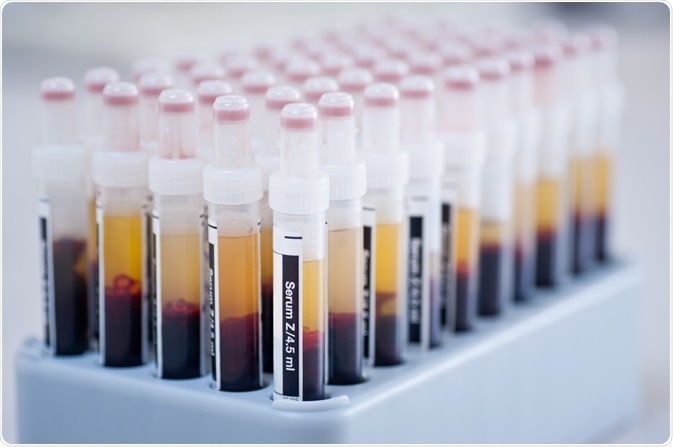Obesity is an increasingly common health problem. To counter obesity, gastric surgeries can be carried out to reduce the gastric volume, such as laparoscopic gastric plication (LGP). It is conceivable that a lower gastric volume leads to reduced food uptake, and thus caloric intake.
However, wider metabolic changes can follow gastric volume reduction, and researchers from Iran and Denmark have recently demonstrated a blood serum proteomics approach to trace biomarkers for metabolic rearrangements following LGP.
Skip to:
 Image Credit: bajars / Shutterstock.com
Image Credit: bajars / Shutterstock.com
The research has been published in the Journal of Proteomics.
Obesity can lead to severe health problems in patients and has a considerable economic cost associated. When obesity becomes severe, surgical procedures can be undertaken which reduce the stomach volume.
Established methods constrain the stomach or remove parts of it, while the more recent approach of laparoscopic gastric plication (LPG) reduces the volume without removing any part – thus lowering the likelihood of surgical complications.
In effect, a feeling of satiety can be reached earlier, lowering the caloric intake. However, metabolic changes beyond the mere feeling of satiety have been reported, for instance, improvements regarding obesity-associated diabetes or fat metabolism disorder.
Scientists from Tehran (Iran) and Aalborg (Denmark), led by Professors Allan Stensballe, Alireza Ghassempour, and Mohammad Talebpour, therefore investigated the blood serum proteome after LGP surgery. They hypothesized that metabolic rearrangements should become evident from blood biomarkers.
In their recent publication, they demonstrate by nano ultra-high performance liquid chromatography coupled to an Orbitrap tandem mass spectrometer (nanoUPLC-Q-MS) that various blood serum proteins become differentially regulated (DR) following LGP.
Searching for biomarkers in the low-abundance proteome
The investigators conducted an observational clinical study on 16 patients who had undergone LGP. Since previous studies had demonstrated weight-loss effects from LGP within the six months after the operation, the researchers collected blood samples at two time points in the six months window after the surgery (T1 at 1 to 2 months and T2 after 4 to 5 months).
The blood serum sample preparation for the liquid chromatography analysis included the removal of the six most abundant serum proteins by multi-affinity chromatography.
While such removal always bears a risk of losing part of the proteome by unspecific binding, the procedure improves sensitivity for low abundance proteins which could otherwise be suppressed by the signals of more abundant proteins. After protease digestion of purified blood serum samples, nano-UPLC-Q-MS was carried out with tandem MS and the protein abundance quantified from MS signal intensities.
Proteome suggests metabolic changes in response to LGP
The scientists identified 224 blood serum proteins and found 6 consistently differentially regulated (DR) proteins after the LGP surgery, i.e. both at time points T1 and T2.
Analyzing the metabolic functions of the DR proteins by database comparison, the investigators identified that the majority of the DR proteins were related to carbohydrate and fat metabolism pathways. Further DR proteins were related to inflammation, including fat tissue inflammatory pathways known to correlate with obesity.
The scientists highlighted that at time point 2, a down-regulation of the fat tissue-specific protein FN1 was observed. This protein is commonly dysregulated in obesity, and the findings indicate a beneficial effect of LGP surgery on FN1 regulation.
Longer observation and more data needed
The scientists thus demonstrated that LGP indeed changed the abundance of proteome biomarkers for different metabolic pathways, and identified 6 DR protein biomarkers by quantitative LC-MS which partially had not been observed in previous studies on gastric volume reduction.
However, a consistent model about the effects of LGP remains elusive because of the small number of patients investigated and insufficient insight into the mechanism of metabolic changes.
To better understand the metabolic consequences of LGP surgery, more patients will be required for post-surgery analysis to improve data significance. This will in turn also allow comparison of the proteome changes after LGP to studies after other gastric volume reducing procedures, in order to determine whether different surgery types will elicit different mechanisms of weight loss.
Source
- Savedoroudi P et al., Serum proteome changes and accelerated reduction of fat mass after laparoscopic gastric plication in morbidly obese patients. Journal of Proteomics 2019, 203, 103373; DOI: 10.1016/j.jprot.2019.05.001.
- The authours highlight that all patients enrolled in this study underwent LGP surgery in Iran (Laleh Hospital, Tehran), and the institutional review board and the ethics committee of Shahid Beheshti University (Tehran) had approved this clinical study.
Further Reading
Last Updated: Nov 6, 2019